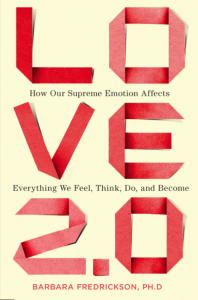What can we do to make ourselves happy? A lot of talk (and research) about happiness focuses on the individual.
Is it what we eat? Maybe. This week, a British study released findings that people who eat more fruits and vegetables are happier. Those who ate seven servings daily were the happiest.
Is it maintaining a calm environment for yourself? Maybe. Gretchen Rubin was heard this week saying that turning off her phone is one key to happiness. The idea is to avoid having a hectic and unmanageable life.
Does it have something to do with other people? Yes. The foremost psychologist on happiness thinks so: Martin Seligman, founder of positive psychology, has noted that all five elements of a life that can “flourish” has to do with other people. (His theory is encapsulated in the acronym “PERMA”: Positive emotions, Engagement, positive Relationships, Meaning, Accomplishment. See Margarita Mooney’s recent post.)
The profusion of research on happiness in the social sciences generally, and the contrasting absence of explicit recent work on the topic in sociology, have obscured the fact that attention to concepts of human well-being has been present all along in the sociological tradition. However, although the word “happiness” has rarely been used, much of sociological literature, beginning with the earliest theorists, has concerned individual well-being, sense of purpose, notions of the good life, satisfaction, contentment, and even exuberance—and how those are related to larger society. It’s worth looking at what sociologists can contribute to understanding each element in PERMA. I’ll start with “P.”
“P” (positive emotions) is in some ways the most personalized of the elements. Emotions that we Americans general think are good (like pleasure, rapture, ecstasy, warmth, and comfort) seem straightforwardly individual. However, these reactions are often socially generated. A football fan in a stadium of other cheering fans during a winning game is caught up in a rapture that is indeed a positive emotion, but he is also wrapped up in a social activity. One of the “founding fathers” of sociology, Emile Durkheim, observed that emotions “ground” the moral rules that society produces (as Chris Shilling and Philip A. Mellor note). We get positive emotions from other people. A lot of the time, such positive emotions occur when things feel “right.” We might experience positive emotions when we receive a smile of affirmation from someone we love, but we might also feel these emotions when we watch this exchange occur between two people we don’t know. So beyond feeling these positive emotions when we receive something (because we are selfish), we also feel them when things feel right or moral. Morality, though, is collectively defined.
Definitions of what kinds of emotions are positive or not can therefore vary: In Chinese philosophy, shame is considered a healthy emotion to feel; in others, it is not. I’ll pick up here next.












